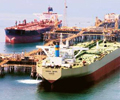

South Korean refiners have paid at least $1/b less for US crude oil than Saudi Arabian grades in the first half of 2021, prompting feedstock trading and procurement managers to strongly favor North American barrels for the next several trading cycles, after taking into consideration the uptrend in Saudi Aramco official selling prices and slower-than-expected OPEC supply hikes.
The world’s fifth largest crude importer received 11.38 million barrels oil from the US in June and paid $68/b on an average for the monthly shipments, showed latest data from state-run Korea National Oil Corp. South Korea imported 21.97 million barrels of crude oil from Saudi Arabia last month and paid $72.50/b on average.
KNOC’s import cost figures include freight, insurance, tax and other administrative and port charges.
For the first six months, South Korean refiners paid on average $63.06/b for 55.2 million barrels imported from the US, while 131.2 million barrels of Saudi Arabian crude shipments during the period cost the companies $64.34/b on average, the KNOC data showed.
The government continues to grant some freight incentives for refiners buying crude oil from regions other than the Middle East, but it is still unusual to see higher quality crude grades like light sweet US oil to cost much less than high sulfur Persian Gulf grades, refinery sources and analysts at Korea Petroleum Association told S&P Global Platts.
“South Korea is purchasing around 10%-15% less crude oil than 2019 — the prepandemic year — but when it comes to preference, US crude is looking much more attractive than Saudi cargoes,” said a sweet crude and condensate trading manager at a major South Korean refiner, who declined to be identified due to the sensitive nature of corporate trading relationships.
“Saudi Aramco may need to speed up its production hike and sharply cut its official selling prices, otherwise lighter and sweeter superior US grades will continue luring Asian buyers,” he added.
Meanwhile, the Brent-Dubai price spread has been rallying this year, which typically makes many light sweet crude grades outside the Middle East priced against the European benchmark less attractive.
However, the widening Brent-Dubai spread does not exactly close the North American arbitrage window for South Korean refiners as the companies usually trade US grades on a Dubai pricing basis, trading desk managers in Seoul and Singapore told Platts.
The Brent/Dubai Exchange of Futures for Swaps, or EFS, spread — a key indicator of Brent’s premium to the Middle Eastern benchmark — has averaged $3.91/b to date in the third quarter, compared with the $3.31/b average in the second quarter, $1.85/b in the first quarter, and the average of 4 cents/b in 2020, Platts data showed.
Source: Platts